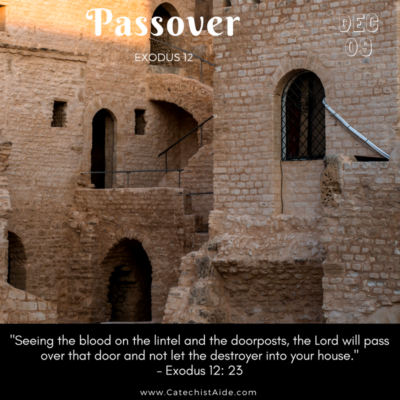December 09: Passover
Traditional Ornament: Doorpost
Reading: Exodus 12
“Seeing the blood on the lintel and the doorposts, the Lord will pass over that door and not let the destroyer into your house.” (Exodus 12:23)
In Exodus, we see God in “full father mode” working through Moses to keep the promise He made to Abraham – to make his descendants a great nation – but first He must free them from bondage in Egypt. God instructs Moses on what to say, “So you will say to Pharaoh, Thus says the Lord: Israel is my son, my firstborn. I said to you: Let my son go, that he may serve me. Since you refused to let him go, I will kill your son, your firstborn.” (Exodus 4:22-23) The Passover in Exodus marks the deliverance of the Israelites from their captivity in Egypt. We remember the Passover during Advent because it foreshadows the reason for Christ’s coming – to deliver us. Just as the blood of an innocent lamb was shed to spare the lives of the Israelites, Christ’s blood was shed to save us all. The Israelites were told to eat the meal with their loins girt, a metaphor for preparedness. This metaphor applies to us as well. In Advent, when we look forward to the second coming of Christ, we recognize that we must be prepared and ready at all times.
Jewish people celebrate the Passover every year to recall their salvation from slavery in Egypt. We eat the Eucharist at Mass and recall the great sacrifice that Jesus made and the ransom that He paid for us.
© 2017 Catechist’s Aide





